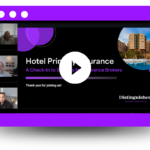Getting an electric shock is not something that most hotel staff or guests prepare for.
When an unexpected zap occurs, injuries can range from mild to severe. An electrical shock could result in burns, shortness of breath, chest pain, nausea, and even unconsciousness and death. In the hospitality industry, opportunities for electrical shock can present themselves in many different locations on-site and should be managed before they cause a life-threatening problem.
1,000 people die annually from electrocution. The majority are workplace-related injuries. However, recent incidents in hotel pools, guest’s private bathrooms, and related to using key cards illustrate that hotel guests have experienced injuries from electric shocks as well.
An unsettling insurance claim resulted after a hotel pool’s lighting system experienced a failure, and the pool water became electric with a live current. One adult who was swimming in the pool was injured after helping a child get safely out of the electrified water. A claim like this can result in costly damages, which should be covered by a comprehensive umbrella policy.
The Occupational Safety and Health Administration (OSHA) reports that the majority of electrical accidents are due to unsafe installation techniques and/or equipment and unsafe work environments and/or practices. It’s a no-brainer to make sure anyone performing electrical work at your company is a properly licensed electrician.
Areas to check
Here are a few areas to check to assess other possible hazards that could directly impact the hotel guests:
- Are guest rooms up to snuff? Examine the fixtures throughout, especially in the bathroom.
- Make sure fire alarms are working and can be heard behind closed doors
- Check the appliances. Ensure that TVs, coffee makers, hair dryers, and other items that use electricity are in good working condition.
- Replace or make repairs to any object with frayed or loose wiring
- Install power strips if needed, instead of overloading sockets
- Record and perform inspections routinely
In case of an emergency
Follow these steps if you are faced with a report of an electrical emergency:
- Train staff routinely and designate certain staff members to respond to electrical emergencies
- Check to see if you can safely turn off circuit breakers while you wait for help from 9-1-1
- If you cannot turn off the source of electricity, and a person is injured and/or unconscious, find an object that won’t conduct electricity to stand on, such as a rubber mat. Use a rug, doormat, or wooden broom or chair to push the person away from the current.
- Do not touch or move a person if the person continues to touch the source of active electricity
- Follow 9-1-1 dispatcher instructions if attempting CPR or other aid
Managing a hotel’s electric safety should be a top priority, regardless of a policyholder’s umbrella protection.




